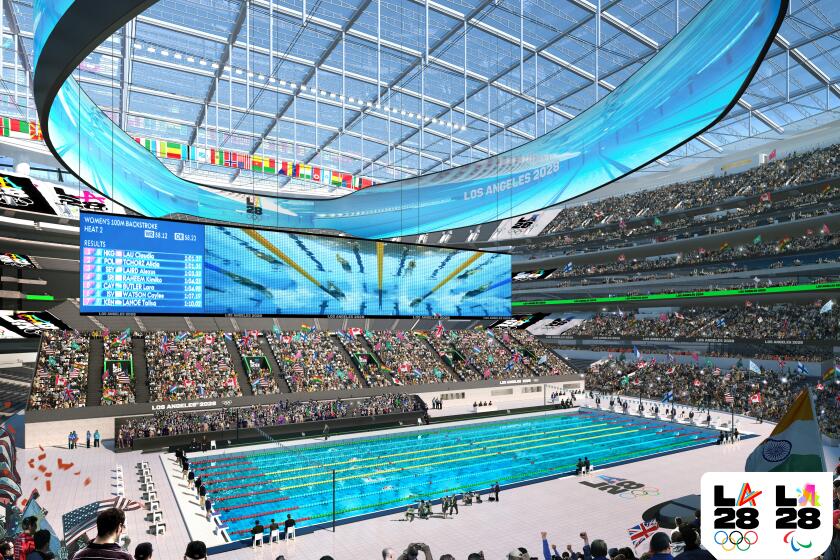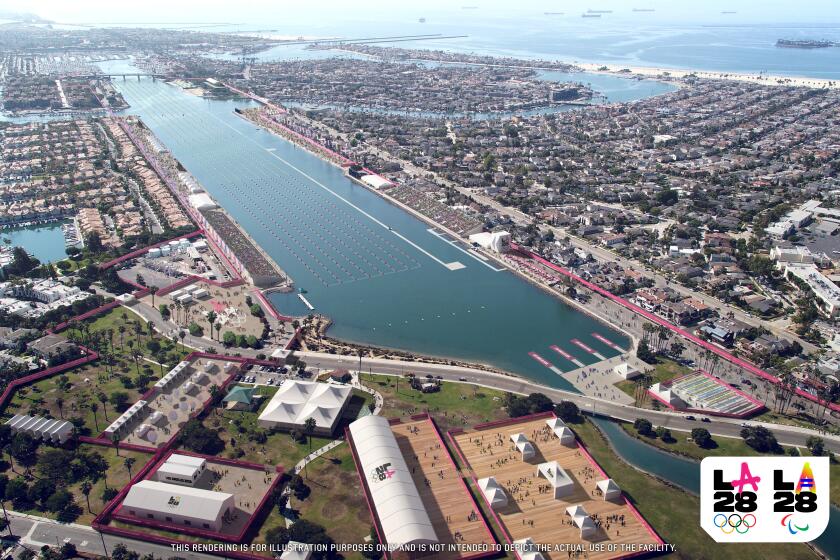Can fire-torn L.A. handle the World Cup, Super Bowl and Summer Olympics?

- Share via
- Faced with a long, tough recovery from wildfires, should Southern California continue plans to host major sporting events?
- Supporters say the World Cup, Super Bowl and Olympics will boost morale and the economy.
- Critics worry that time and resources spent on sports over next three years will detract from rebuilding.
The wind and flames that continue to plague Southern California — and the long, costly recovery that lies ahead — have raised new concerns about hosting three major sporting events over the next three years.
World Cup matches are scheduled for SoFi Stadium in the summer of 2026. Then comes the 2027 Super Bowl, followed by the 2028 Summer Olympics.
With none of the region’s stadiums or arenas damaged so far, event organizers and government leaders have expressed confidence about pushing ahead.
“Los Angeles is defined by its resilience and determination,” Casey Wasserman, chairman of the LA28 organizing committee, said in a statement. “The strength of our communities and our unity in tough times make this city extraordinary, and when Los Angeles welcomes the world in 2028, our spirit will shine brighter than ever before.”
Professional sports teams and Fanatics partner on a campaign to raise money for the American Red Cross and the Los Angeles Fire Department Foundation.
But others worry about sports usurping resources and valuable attention that should be devoted to rebuilding.
“Any city preparing for three massive events has its hands full,” said Jules Boykoff, who studies the politics of sport at Pacific University in Oregon. “If these good people in the government are working on the Olympics and the Super Bowl, they are not working on other issues.”
Each of the events will have a different impact on the city. The Super Bowl will take place on a Sunday at SoFi Stadium in Inglewood. The World Cup, also at SoFi, will feature eight matches in the space of a month.
The Summer Games will involve thousands of athletes, dozens of venues across the region and an estimated 15 million visitors over 17 days in July of 2028. That will be followed the next month by the Paralympics, another event expected to bring thousands of athletes and spectators to the city.
L.A. wants a car-free Olympics but the $3.3 billion in transportation projects needed to make it happen are only 5% funded. Officials are looking to the next presidential administration for help.
Only two proposed Olympic venues were threatened by wildfires. Riviera Country Club, which would host golf, fell inside the Palisades fire evacuation zone and UCLA, which would serve as an athletes village in 2028, was just outside the warning boundary.
SoFi was about 15 miles from the nearest flames, yet the NFL decided to shift Monday night’s playoff game between the Rams and Minnesota Vikings to Phoenix.
“The guiding principle for us has always been, don’t interfere and do anything that’s going to impact negatively on public safety,” NFL commissioner Roger Goodell said in an interview. “Make sure you’re not sapping resources from the responders.”
Conservative commentators such as Trish Regan and Charlie Kirk called for a stronger response.
“We must move the Olympics out of [California] as fast as possible,” Regan posted on X, adding that the state’s leadership “cannot be trusted.”
The idea of switching host cities is not new. As early as 1908, the International Olympic Committee wanted Rome as host but shifted to London after Mount Vesuvius erupted, devastating the nearby province of Naples.
Olympic swimming events at SoFi Stadium? Yes, say 2028 Olympic organizers, who plan to hold events at venues that will provide more seats and raise more money.
It is ironic that Southern California now finds itself in a comparable situation.
Before the 1924 Summer Games, when host Paris was beset by floods and economic struggles, L.A. civic leaders volunteered their city as a last-minute replacement. France was able to stage the Games, but the offer to help was not forgotten.
“It got them in the good graces of the IOC,” said Mark Dyreson, a sports historian at Penn State. “They developed this mythology that L.A. was the great backup city.”
The Games eventually came here in 1932 and 1984, reinforcing the ever-ready reputation. Plans for 2028 will rely almost entirely on existing venues such as SoFi, the Intuit Dome and the historic Coliseum, avoiding the massive construction required of past hosts.
Capital costs notwithstanding, the Olympics will require additional police, traffic control, garbage collection and other public services. LA28 has vowed to generate enough revenue to reimburse the city and pay all other expenses in its $7-billion budget, but should there be a shortfall, city and state officials agreed to contribute hundreds of millions in taxpayer dollars.
Man-hours are another issue. Planning for the World Cup, Super Bowl and Olympics is well underway, with various cities preparing studies, negotiating contracts and forming subcommittees. Council members have spent hours discussing the matter.
The extra workload could be problematic for leaders also dealing with wildfires.
“How can we handle these things properly at the same time?” said Eric Sheehan, a spokesman for the grass-roots NOlympics LA group. “The only alternative is to short-change devastated residents.”
In regards to the Games, the host city contract that L.A. signed allows the IOC to terminate under specific circumstances; also, organizers could plead their case to Olympic officials. Denver was awarded the 1976 Winter Olympics, then withdrew two years later when voters rejected a funding referendum. Those Games landed in Innsbruck, Austria.
Despite the many challenges facing Southern California, critics don’t see L.A. backing off. “I fully expect leaders in Los Angeles to fashion a ‘recovery’ narrative,” said Boykoff, the Pacific University professor.
Japanese officials took this approach when bidding for the 2020 Tokyo Olympics after the 2011 Fukushima nuclear plant disaster, claiming that big events can lift community spirits and boost the economy. The IOC always has liked the idea of the Games having a positive social impact.
Long Beach will host seven sports and Dignity Health Sports Park in Carson will host four as part of an updated venue plan for the 2028 Olympics.
Gov. Gavin Newsom already touched on this theme for L.A., talking to NBC News about “all that opportunity, that pride and spirit that comes from hosting those three iconic [events].”
When asked if the city can be ready in time, he said: “My humble position, and it’s not just being naively optimistic, that only reinforces the imperative moving quickly, doing it in the spirit of collaboration and cooperation.”
The governor predicted that President-elect Trump, who has made a habit of attending high-profile games, will be motivated to help.
At this point, with fires still active in the region, World Cup officials say they are monitoring the situation. LA28 leaders are focused on immediate concerns — some employees have been affected — and will turn to long-range plans later.
The past week has shown that everything can change in the blink of an eye, so three years is a long time. If L.A. decides to stick with its plans, Boykoff warned, “you kind of have to expect the unexpected.”
More to Read
Go beyond the scoreboard
Get the latest on L.A.'s teams in the daily Sports Report newsletter.
You may occasionally receive promotional content from the Los Angeles Times.











